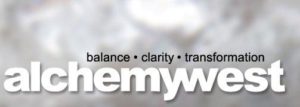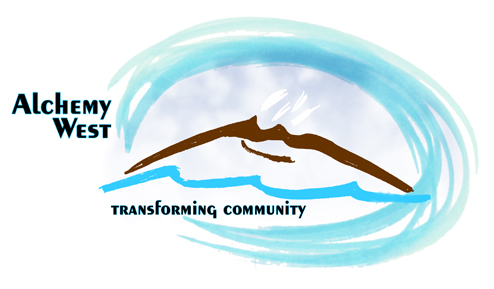
Copyright (c) 2011 by Danny L. McMillin
In Memoriam: Randall Ray Fritz, July 26, 1947 – November 1, 1961.
Years ago, I couldn’t imagine that today would ever occur.
Today, it’s been 50 years. What to make of them?
In October 1961 my grandparents came out from Montana to visit. My oldest brother, Randy, was sick, in and out of the hospital, and in those days, it was a long drive to Salem from our small Oregon home town. So far, in fact, that in September Randy moved to Salem to live with our grandparents during the week, so he could attend Catholic high school.
Just like that, Randy got sick.
I remember the last time I saw him. He was in the hospital, pale and thin beneath the covers. Alert.
I was just a kid. Naïve. Trusting. Sheltered. Optimistic. Like all kids and many adults I was uncomfortable visiting the hospital. And I didn’t know why Randy was there and couldn’t come home.
All I knew was that I had always adored my older brother, which is not the same thing as always liking him. But the sun rose and set on Randy. Even when we talked about death in school—because Catholics, at least, only talk about dying, from getting ready to die to actually doing it—I used to think that everyone could die, even my parents.
But not Randy. No, Randy would never die.
All those years ago, I didn’t know what it meant to be intuitive. I just remember what hit me in those last few moments, before we left that day. The last day I saw my brother alive.
Surrounded by family, Randy looked over at me, held out his hand, and as I reached out and held his, our eyes met. In that moment, I knew.
Randy was dying. And he knew it. In that shared moment he said goodbye.
I was too stunned to do anything but stare at him in shock.
I don’t remember when that last day was. Sometime in late October the doctors told my parents that Randy had leukemia and would die in six weeks to six months. He was gone in less than a week.
Sometime in those last days the doctors also asked my parents to allow them to use Randy as a guinea pig. Literally. They need drug trials on a promising drug that wouldn’t help Randy, but might help others in the future.
My dad was a pharmacist. He knew from drugs. My parents agreed.
That last morning my Grandma Fritz sobbed at the kitchen table while my younger brother and I played. When asked, over and over, why she was crying, she simply said she felt sorry for Randy. It didn’t make any sense to me. Nothing did.
I had no context. Why would it make sense?
Later, we were called in from playing. I was taking off my shoes when my mom walked over to me and blurted it out.
“Your brother went to heaven an hour ago.”
I stared at her in confused, stunned silence until it sunk in. I burst into tears. In some ways I have not stopped crying all these years later.
My brother’s death destroyed my family. There’s no other way to put it. My parents … when I think of them I think of impossible grief. Of two people who’d survived a world war, created a good business in a small rural community, raised their kids to be honest citizens, anticipated a future bright with promise, and lost their oldest child in a matter of days to a disease they’d never really heard of.
On November 1, 1961.
My parents never recovered. Sure, they laughed again, they raised us, they staggered on. To a degree. With pain like that you have two choices: to grieve and move on, or to block yourself emotionally. I’m not sure which is the easiest, but they chose to be blocked. Because of that, two little kids didn’t just lose a brother that day.
I think now everyone must have known that Randy was dying except the children. Everyone had time to prepare, except for my younger brother and me. I think even Randy had time to prepare. They never told him he was dying. But I know he knew. I knew that day.
The community rallied around us. Food arrived. Friends and family and strangers flocked to the funeral home. To the funeral. There were so many flowers that the smell overwhelmed me, and, after being forced to touch Randy’s cold, stiff hand as we stared at him in his coffin, the flowers choked me and I turned and raced away as fast as I could, with my uncle running behind me trying to help. He did. But I re-live that nightmare every time I walk into a florist shop. I can’t stand the smell of carnations.
So here’s another story. For several years the community had been raising money to buy land to build a Catholic high school. That school was dedicated two years later, in 1963. My brother and I graduated from it, as did my nephews.
In their shock and grief my parents sought comfort. They decided to scrimp and save and donate $5,000 to the building fund for the school chapel, built in Randy’s memory. It was still there several years ago, at my nephews’ graduation. Once I learned the truth of that chapel, I never cared about it again. My parents had given the money they thought they would spend on Randy’s college education to build that chapel—to somehow make his death mean something, to ease their sorrow, I don’t know. Some people respected them for it. Others decided that if we had that kind of money to give away, then we didn’t need their business.
I know this sounds bitter. Really, it’s ironic. It’s all part of community, isn’t it? The not so nice part that you can sometimes understand because community isn’t perfect. It’s a whole lot of work. Even when it doesn’t work.
I didn’t get to say goodbye to my brother. I carried that pain and grief for years, the fear, that many kids have, that petty jealousies somehow cause our stricken sibling to die. That took years to get over. It makes me really useful to kids who are dealing with that now, because I know exactly what they’re feeling, even if they won’t say it. But I can tell them. And their parents. I can tell them to talk to each other. To hold on.
But for me, truly, it took a dog, and a dog’s well-lived life, to let the grief go. It took creating a family of my own, and seeing family beyond humans, to heal that grief.
It took expanding community to include all life, and working to build it. It took the ongoing work of creating a community with all life—that’s what I do, however I can, in fits and starts.
And healing took a goddess, but that’s another story.
Here’s the thing about grief.
Grief teaches us about all things. From grief we learn hatred. I learned to hate god. On the day we buried Randy I decided that a god who would allow my brother to die was not a god I could respect, or love, or acknowledge. Despite years of being a devout Catholic, and finally being brave enough to leave, I’ve held on to that. Call me stubborn. And consistent. And … whatever works for you.
Grief teaches us fear. If we can lose someone we love, then why risk it? Close the door and hide.
Grief teaches us compassion. Again, you can choose to block life, like my parents did, or you can choose to move on, which is what I did, eventually. Compassion helps our hearts to cry while allowing others to cry with us. Compassion gives us the freedom to reach beyond the hurt to build community. Like my parents did with that chapel.
Grief teaches us love. If I had not been hardened by grief I would not have melted with love. If I had not defied my old community, the one of faith and religion and limitations and petty jealousies and extraordinary generosity and everyday comradeship, I would not have my new community. It means everything to me.
Without grief I would not now be a citizen of the world. I would not now be an intuitive who can talk with all beings, from animals to businesses to homes, to the land and waters and weather around us. I would not now be able to offer compassion to all life.
I would not now have the crystal Fallon as my partner.
There were many things I had to re-learn in the lives that led us back to each other: Fallon, the citrine Lemurian quartz who was rejected around the world, and the lonely lost girl whose invincible adored brother died.
I had to learn the alchemy of grief.
Alchemy is magic. Transformation. The changing of one thing to another.
Given a chance, grief becomes love.
That’s what I finally learned today. The day I realized that it’s been 50 years since my brother died.
Today I learned the alchemy of grief.
So here, 50 years later, I can finally say the tears have stopped. I have moved on. It’s done now. It has been. It’s just time to say it.
Yes, today I finally get to say goodbye to my brother.
Randy, thank you for taking a drug that couldn’t save you, but is now saving so many lives. Thank you for making methotrexate possible. They use it for rheumatoid arthritis now, and at one time it helped our dad as it is now helping a dear friend; it also helped a college student I knew years ago recover from the leukemia that killed you.
Randy, thank you for being my brother.
Randy, thank you for whatever it was we learned together.
Randy, thank you for saying goodbye to me.
Goodbye, Randy.
© 2011 Robyn M Fritz
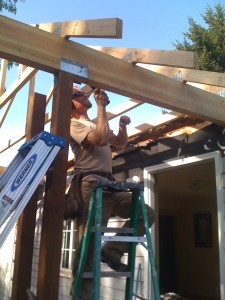 At Alchemy West and our magazine,
At Alchemy West and our magazine, 
![GreenVoteYes[1]](http://www.alchemywestinc.com/blog/wp-content/uploads/2011/09/GreenVoteYes1.jpg) Unfortunately, I think what most women have in common is an obscene phone caller. We’ve either had it happen to us or to someone we know.
Unfortunately, I think what most women have in common is an obscene phone caller. We’ve either had it happen to us or to someone we know. I was out with the dogs, scooping poop as we meandered down the street.
I was out with the dogs, scooping poop as we meandered down the street.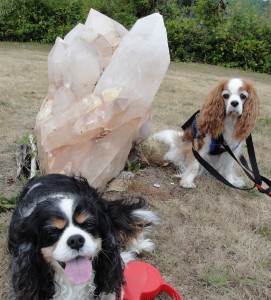 I live on the Planet of Awesome and Forever.
I live on the Planet of Awesome and Forever.
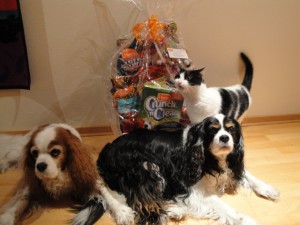 On the weekend before the Westminster Kennel Club Dog Show back in February I attended a
On the weekend before the Westminster Kennel Club Dog Show back in February I attended a 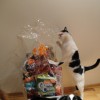 I also got lucky and won a raffle prize from Hartz at the writing conference. A few weeks later this enormous gift basket arrived in the mail, full of Hartz treats, combs, brushes, a toothbrush, toys galore, and a wonderful note from Jennifer Dombkowski, Integrated Marketing Manager at
I also got lucky and won a raffle prize from Hartz at the writing conference. A few weeks later this enormous gift basket arrived in the mail, full of Hartz treats, combs, brushes, a toothbrush, toys galore, and a wonderful note from Jennifer Dombkowski, Integrated Marketing Manager at  It was far more than my multi-species family could use, although these pictures prove that they were fascinated! And, yes, played with a toy or two.
It was far more than my multi-species family could use, although these pictures prove that they were fascinated! And, yes, played with a toy or two.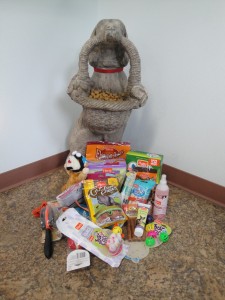 Thanks to Hartz’s generosity at a pet writing conference in New York, a group of homeless dogs and cats in rural western Washington had some fine treats and toys. Jefferson County’s animals have taken a hit with the tough economy, and this briefly helped.
Thanks to Hartz’s generosity at a pet writing conference in New York, a group of homeless dogs and cats in rural western Washington had some fine treats and toys. Jefferson County’s animals have taken a hit with the tough economy, and this briefly helped.